There’s a saying that’s been popping up on social media more and more lately: “No one hates Star Wars more than Star Wars fans.”
The fandom in general gets a bad rap, since the loud minority tends to drown out the most positive comments and perspectives on the franchise as a whole. But the statement isn’t completely false — mostly because the Star Wars fandom is full of critics, and many people simply don’t know how to civilly respond to opinions they don’t agree with.
However, it’s unfair to tell someone with a harmless negative opinion: “Stop complaining and just enjoy Star Wars” as well.
![Cad Bane [Corey Burton (voice); Dorian Kingi (performance artist)] in Lucasfilm’s THE BOOK OF BOBA FETT, exclusively on Disney+. © 2022 Lucasfilm Ltd. & ™. All Rights Reserved. Cad Bane [Corey Burton (voice); Dorian Kingi (performance artist)] in Lucasfilm’s THE BOOK OF BOBA FETT, exclusively on Disney+. © 2022 Lucasfilm Ltd. & ™. All Rights Reserved.](https://images2.minutemediacdn.com/image/upload/c_fill,w_16,ar_16:9,f_auto,q_auto,g_auto/shape/cover/sport/ab79713425dc0d16e18ee5795f6aafda9a0dfe0d159b594f1b195e8ce11c680e.jpg)
Criticism is part of fandom. In general, people want the media they love to be the best it can be
for them
— and sometimes that means pointing out flaws they can’t see past. There’s nothing wrong with that. As fans, we’re entitled to discuss and critique the fictional universes we’re obsessed with.
But sometimes, such criticisms are met with their own critiques — often from people who don’t agree with a particular “take” on a Star Wars topic. Fans don’t have to agree on everything, and essentially never will. Differences of opinion comes with the territory and actually makes a fandom more interesting to engage with. If everyone in the Star Wars community had the same opinions on everything, there wouldn’t be anything to talk about.
These differing opinions, however, often turn hostile — so often because both sides feel strongly about their thoughts and feelings and, even if the intent was never to attack someone else’s opinion, having yours challenged can feel like something you have to defend. Why is that?
It mostly comes down to the fact that fans generally consume Star Wars for two main reasons: escapism and analysis. But most important to note about these two things is that they often fluctuate for different people at different times. You might go through a phase where all you want to do is pick apart every Star Wars detail to extract different meanings and ideas. And depending on what’s going on around you, you might make an abrupt shift to only wanting Star Wars to be something you consume for fun. You no longer want to be critical of it; you just want to be happy that it exists.

Can you operate in both of these phases at the same time? Possibly. You can criticize certain parts of the franchise and simply let other parts of it be as they are without comment. But that’s still going to land you in situations where you’re the one being “overly critical” or you’re witnessing someone else seemingly behaving that way. It’s natural to have an initial negative reaction to any opposition on either front because it’s the opposite of your stance.
What many Star Wars fans simply aren’t good at — myself included, oftentimes — is practicing empathy toward the people behind the other side of your argument. You don’t always know what’s going through someone else’s head when they make a seemingly inflammatory statement like: “I think Han Solo is overrated.”
That’s a strong opinion. If you’re the one putting it out into the universe and someone else responds with hostility, chances are they’re in an escapism phase — they don’t want to hear your criticisms of a scruffy-looking nerf-herder; they just want to appreciate Han for existing. But they could have a better reaction to your opinion, too. Both sides are often at fault for things escalating into the online arguments many of us know and try very hard to avoid.
As long as an opinion isn’t directly attacking another person, it can’t be “wrong.” We disagree because we’re not all the same. When someone seems to be over-critical of something in Star Wars that you like, consider that maybe they’re currently finding enjoyment in taking a closer look at the details. And when someone seems defensive of your criticism, remember that they might need Star Wars to be their source of joy and fulfillment right now. You don’t have to respond, even when they respond to you.
Star Wars and its many parts mean something different to us at different points in our lives. Be critical. Want your favorite thing to be better. But also respond to others’ criticism with kindness. If they’re not attacking you, there’s no reason to respond with an attack. Disagreements seem a lot bigger online than they often are, and sometimes the best thing to do is choose to walk away.
Follow Dork Side of the Force for all your Star Wars news, reviews, and more!
